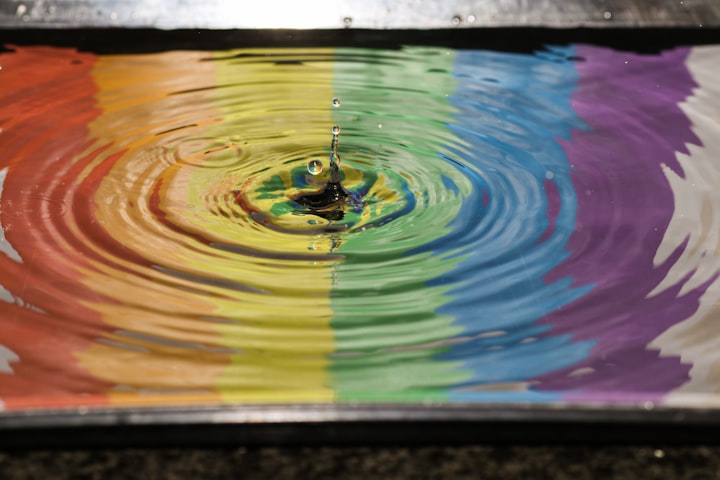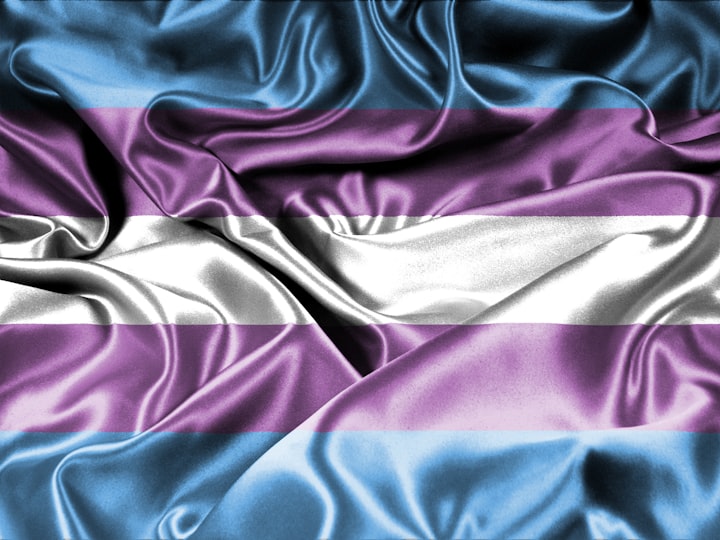Crossing Boundaries
Living in a foreign country is like being trans- I’m always crossing boundaries and living a life different than the standard
If you think about it, living in a foreign country and being transgender have a LOT in common. Of course, when you first ask the question, it doesn’t seem to make much sense. I mean, how in the world are they possibly related??
Well, as a non-binary trans person who has been living abroad for almost 5 months now, let me just give you a taste of the basics.
When you’re living in a foreign country, everything is different- even the things you never thought of. Especially the things you’ve never thought of.
This is from anything seemingly small, like your laptop charger not being the correct plug for all the outlets, to something huge like language or laws. Trust me, even when you’ve studied the language, laws, and culture in theory, it’s totally different when you actually get there. There’s so much you’ve never even considered, and honestly, for the first month or so, minimum, it’s pretty overwhelming. Exciting, but too much.
It’s very clear that everything that you are is different from the world you currently find yourself in. You try and adapt, to pick up these little habits and mannerisms to try and fit in as a native, or at least like you know what you’re comfortable, when everything just feels… off.
This isn’t exactly how every trans person feels, but it’s similar enough to make the comparison. The land you’re in, in this case, your body, isn’t representative of your true self.
As an American, a place like, say Canada, has a lot of similarities and I could probably pass. But just because I can appear like a Canadian doesn’t mean I AM a Canadian. Just like I can appear to be female and have the typical reproductive genitalia as a female doesn’t mean I AM female. Mimicking, pretending, acting, passing, conforming… none of that makes us any more native or cisgender than we ever were. It just means that the environment were are in, either country or body, is not the one that fully represents the real Us.
Another similarity is the reaction.

When someone finds out I’m American, they usually have one of two reactions: excitement or disgust. Especially being in a pandemic during the winter, there aren’t a lot of Americans in more rural parts of Europe. In all actuality, right now, unless you’re a native European, chances are, you’re not in Europe- at least not for longer than a day or so due to layover flights. So, a lot of the reaction I’ve gotten when people find out I’m American is excitement, awe. They have so many questions for me, some of which are a bit inappropriate to ask a stranger. Who did I vote for, do I own a gun, do I pay thousands for healthcare, how much debt do I have? The list goes on.
But when it comes to speaking with more ‘professionals,’ is where I start to see the disgust or dismissive nature. My oral comprehension in my second language is, admittedly, not the best, but I can read and write well, or respond decently and hold a conversation if I know what the question or context is. The bank tellers, the doctors, the train staff… Almost every single one of them have been dismissive and gotten visibly irritated by my presence damn near immediately after realizing I was not a native. Most citizens or people on the street have been overly kind, happily repeating a word or sentence, and even helping me fix my pronunciation. These officials however? They seemed to prefer if I didn’t exist and even appeared to get frustrated the more I tried to speak and understand.
The same thing happens when someone finds out I’m trans.
I’ll either get an influx of, sometimes extremely insensitive or private, questions, or I’ll be written off. They want to know my plans for transitioning, and what steps I’ve already taken. How much money have I spent on these things, am I/do I plan to go on hormone replacement therapy (HRT), have/had gender confirming surgeries, do I have a dead name or do I want to change my name? There’s plenty more, but these are just to name a few.
The same type of thing that happens when someone finds out I’m not a native happens when people find out I’m not cis. Sometimes, even more aggressively so. Now, in this case, there are more people in the day to day who would visibly show disgust at me being trans than I’ve received being American- at least, in these five months of experience vs nearly two years of being out as trans.
Even though I’m nonbinary, physically, it’s really hard for me to hide the fact that I am assigned female at birth. At least, as of yet. My body type definitely shows my hips and chest, and with the clothes I wear, most people get a mental assumption that I’m queer (most likely suspect lesbian), but rarely assume trans/enby. There’s also still a lot of dialogue about the trans community and it’s validity at all, but especially so on the existence of our enby population.
As such, I will get many derogatory comments about this aspect, about pronouns, about how I can’t just decide that I’m not a woman when clearly I must be. Or, if they’re not directed at me specifically, just at trans/nonbinary people as a whole. Other people will say things like, “I’ll pray that you find the right path,” or “just accept you have tits. You can’t change who you are.” Even others will just become standoffish, with scoff in disgust, give me side-eye glares, and ignore me completely. If this is the case, and they know my pronouns, they’ll usually make the point and put an emphasis on using she/her pronouns rather than they/them.
In many cases, this continues into the professional sphere. It (thankfully) has not happened to me as of yet, at least to this extent, but there are many documented cases where officials refused service/care to someone after finding out they were trans. When this occurs in healthcare, there are many instances where this person becomes very ill, injured, or even loses their life. They can be denied transportation, financial services, jobs, ect, or even if approved, have to go through a grueling, embarrassing, and deliberately discriminatory process.
This also hasn’t personally happened to me in this new country, but there are many cases where this occurs to a plethora of immigrants across many, if not all, countries around the globe. This is particularly true for people of color, evident religions, or from specific regions. As I appear to be a white female, these foreign immigrant prejudices rarely impact me personally. Not everyone is so lucky.

Now, all of this already screams similarities between the two, but these are far from all of the ways in which the two relate to each other.
In a way, they both cross boundaries.
In terms of living in a foreign country, its borders. I crossed the borders of my own state, country, continent, to live my life in another. In the same way, when I realized and started living my authentic self, I crossed the borders of femininity. I left my forced womanhood behind, and embraced life as me- outside the gender binary.
In both cases, I am no longer living an ordinary life. For many people, they continue living in their native country, and are okay with that. For many people, they continue living as their assigned gender at birth, and are okay with that. I am neither. Neither of these boundary crossings are the standard, and I have gotten questions and complaints from people who have no influence on my life or happiness. Why don’t I want to live in my home country? Why don’t I want to be a woman? Am I ashamed? Do I think less of these people/places?
One, the answers to these questions are no one’s business but my own. Two, these are usually inappropriate or even rude to ask, especially if I don’t personally know the person who is demanding these answers. Three, the answers don’t matter because they don’t change any of the facts: I am living abroad and I am transgender.
Point blank, period, end of story, the end.
Well, in regards to these types of questions. I still have more points and similarities to explain, including boundary crossings.
There are set barriers, rules, expectations to be a citizen of, or live in, a specific country. However, as an immigrant, and a short-term one at that, it’s all a bit challenging. Some of it doesn’t quite feel real, or make much sense to me. When it comes to social norms, like dialects, body language, appearance, ect, it can be even harder to fit in and associate with those around me. It may not always be evident that I’m foreign, especially if I don’t speak, but most can still tell that something is different about me. I can definitely tell the difference. I always feel left on the outside. Like there’s something I’m missing that just sets me apart from those around me.
I get that same feeling being trans, which was amplified before I started to make changes to represent my authentic self.
Living 22 years of my life as a female, every time I was around other females, I always felt like there was some secret to be a girl that I just… didn’t know. Sure, I could pass as one. Few ever questioned the validity of my femininity. However, it always felt forced and most still found me rather odd for a girl. In terms of my personality and mannerisms, I have even been told I could pass for a guy, if I didn’t have such a female shape. But, there too, I still had that ‘I don’t quite belong here’ feeling.
These gender norms, these expectations, these rules… While I can live with them, they just don't feel right. I don’t feel comfortable immersing myself in them. So I cross these boundaries to showcase my authenticity, outside the gender binary, outside of gender itself.
I am not a citizen of the country I am living in, nor am I a member to the body that I was born into. I am something, someone completely different.
These borders cannot contain me.
About the Creator
J. Lee
French enthusiast, non-binary trans person, artist, writer, lover of animals, space, and the right for every living thing to experience their existence authentically.
Pronouns: they/them (English) iel (French)








Comments
There are no comments for this story
Be the first to respond and start the conversation.